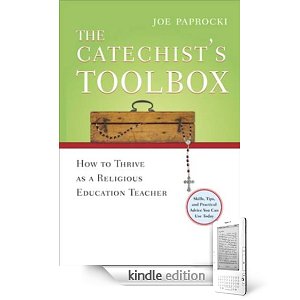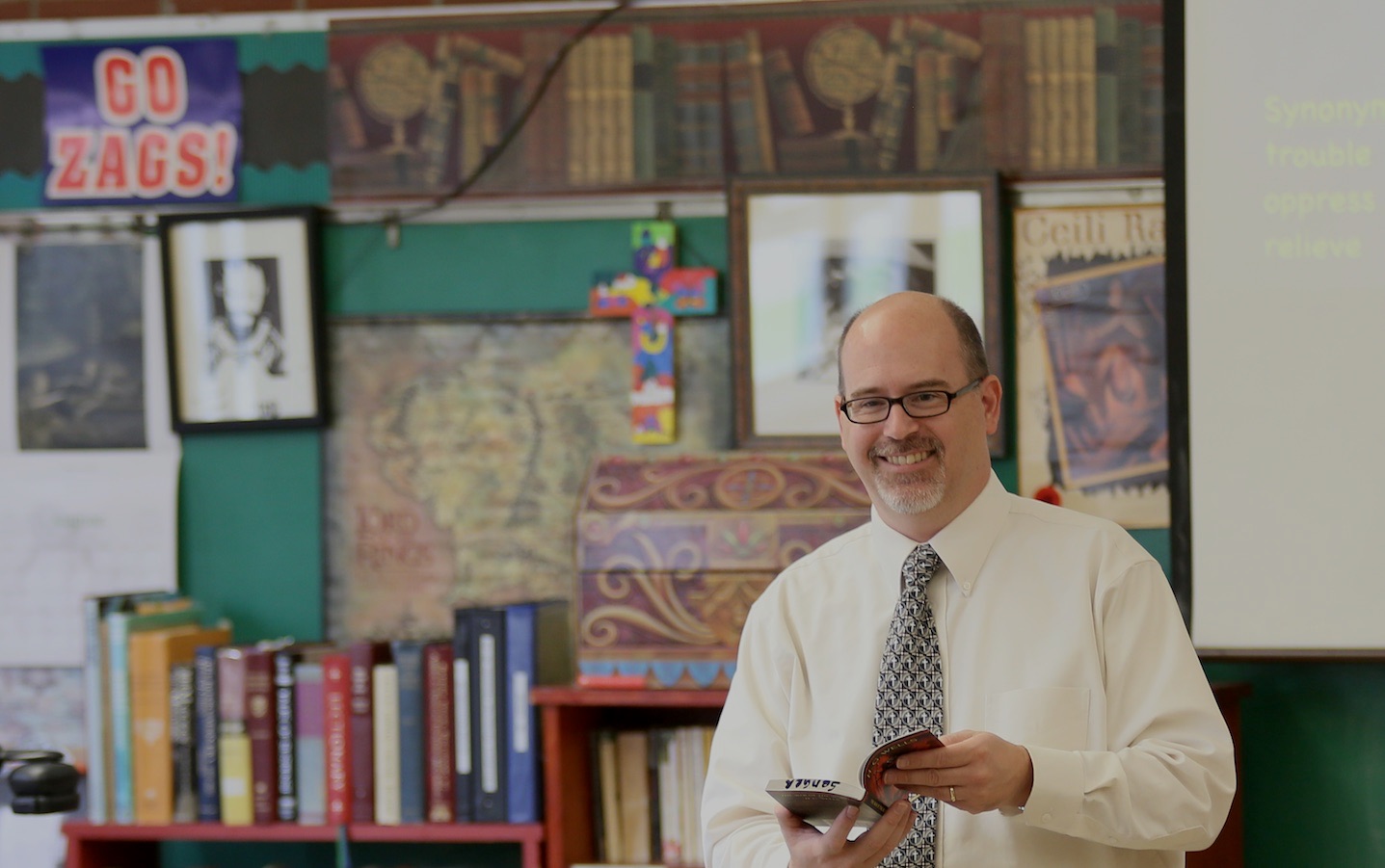
Kindle Books for Catholic Educators: Saints and Shakespeare
In this week’s Kindle Books for Catholic Teachers we share a book on the saints for teachers and a pair of books for those who teach Shakespeare in Catholic schools. Each book is also available in print form, for a slightly higher price.
My Best Teachers Were Saints: What Every Educator Can Learn from the Heroes of the Church, by Susan Swetnam. Loyola Press. Printed Length: 298 pages. Kindle Price: $9.99
Dry spells and indifferent students, acrimonious meetings and recalcitrant colleagues, isolation and self-doubt–the
stresses of the teaching profession are plentiful. In times of strain, many teachers draw on the wisdom of their mentors, the seasoned teachers who taught them classroom skills and became trusted models and friends. For Susan H. Swetnam, some of the best, most inspiring, and most insightful mentors she has are saints of the Catholic Church–and a remarkable number of these men and women were teachers themselves. In fact, many of the church’s heroes achieved their saintly stature by facing challenges identical to those that teachers face today.
Some of the fifty-two saints described in My Best Teachers Were Saints give lessons on how to overcome the teaching profession’s unique problems; others show today’s teachers how to identify successes that are often quite difficult to discern. All of the saints in this book share one thing in common: they persevered in the educational work that God called them to do. Swetnam brings to life each story of perseverance and makes it easy for today’s educators to discover mentor-companions who can help them rekindle and fortify their passion in the classroom. – Amazon.com
Quest for Shakespeare: The Bard of Avaon and the Church of Rome, by Joseph Pearce. Ignatius Press. Print Length: 367 pages. Kindle Price: $13.17.
Highly regarded and best-selling literary writer and teacher, Joseph Pearce presents a stimulating and vivid biography
of the world’s most revered writer that is sure to be controversial. Unabashedly provocative, with scholarship, insight and keen observation, Pearce strives to separate historical fact from fiction about the beloved Bard.
Shakespeare is not only one of the greatest figures in human history, he is also one of the most controversial and one of the most elusive. He is famous and yet almost unknown. Who was he? What were his beliefs? Can we really understand his plays and his poetry if we don’t know the man who wrote them?
These are some of the questions that are asked and answered in this gripping and engaging study of the world’s greatest ever poet. The Quest for Shakespeare claims that books about the Bard have got him totally wrong. They misread the man and misread the work. The true Shakespeare has eluded the grasp of the critics. Dealing with the facts of Shakespeare’s life and times, Pearce’s quest leads to the inescapable conclusion that Shakespeare was a believing Catholic living in very anti-Catholic times.
Many of his friends and family were persecuted, and even executed, for their Catholic faith. And yet he seems to have avoided any notable persecution himself. How did he do this? How did he respond to the persecution of his friends and family? What did he say about the dreadful and intolerant times in which he found himself? The Quest for Shakespeare answers these questions in ways that will enlighten and astonish those who love Shakespeare’s work, and that will shock and outrage many of his critics. This book is full of surprises for beginner and expert alike. – Amazon.com
Through Shakespeare’s Eyes: Seeing the Catholic Presence in the Plays, by Joseph Pearce. Ignatius Press. Print Length: 364 pages. Kindle Price: $9.99.
Fulfilling the promise he made in his previous book, The Quest for Shakespeare, bestselling literary writer Joseph Pearce analyzes in this volume three of Shakespeare’s immortal plays – The Merchant of Venice, Hamlet and King Lear – in order to uncover the Bard’s Catholic beliefs.
In The Quest for Shakespeare, which has been made into an EWTN television series, Pearce delved into the known
biographical evidence for Shakespeare’s Catholicism. Here the popular and provocative author digs into the plays, which were written and first performed during the English crown-s persecution of Catholics. English history and literature were taught for generations through the prism of English Protestantism. Of late both of these fields have been dominated in universities and academic presses by modern scholars with filters and interpretations of their own. Though the evidence for Shakespeare’s Catholicism has been studied before now, thanks, in part, to the unique contribution of Joseph Pearce, the Bard’s genius is being analyzed in the open air of the public arena, the very place where Shakespeare intended his dramas to entertain and edify. – Amazon.com
How to Pray the Jesuit Examen – A Video Tutorial for Teenagers
Our kids can never get enough guidance in prayer. The following video from St. Ignatius College Prep in San Francisco is a relevant, practical example of the Jesuit examen and might help your students understand this prayer:
What Is the Future of Catholicism?
 The Patheos website has a very interesting series of articles by prominent Catholic thinkers on the topic “Future of Catholicism.” As Catholic educators, it’s important to have a broad sense of what’s happening in the Church, and these articles offer intelligent insights into where we might be heading, where we ought to be heading, and where we should avoid heading.
The Patheos website has a very interesting series of articles by prominent Catholic thinkers on the topic “Future of Catholicism.” As Catholic educators, it’s important to have a broad sense of what’s happening in the Church, and these articles offer intelligent insights into where we might be heading, where we ought to be heading, and where we should avoid heading.
Here are some choice quotes from the essays:
The answer, in other words, lies not in writing off popular culture and entertainment as some are inclined to do. Instead, Catholics need to become part of this world and transform it from the inside. – Tony Rossi
Use new media pro-actively; let the Holy Spirit guide you to the allurement of God’s people — as in Hosea 2:14 — in bold and sanctifying contrast to the vast wasteland that clutters the mind and warps the soul. Mount a website, get something on YouTube, pod-cast your sermons, post advice on FaceBook and tweet daily. – Fr. Robert Barron
The Eastern Church has managed nicely with a married clergy for hundreds of years. And I believe the Latin Church will one day adapt the same model: permitting married men to be ordained, but still retaining celibacy as an option (and, most likely, reserving the episcopacy only for those who are celibate, thus ensuring that the Vatican won’t have to contend with the peculiar circumstances of having a Mrs. Pope standing at her husband’s side while he offers a blessing from the balcony of St. Peter’s). – Deacon Greg Kandra
Unfortunately, many now know Catholics only by what they oppose: same-sex marriage, women’s ordination, abortion, etc. In the future, let’s be known by what we advocate. Let’s focus on the positive. At the very beginning gushed forth a wellspring of compassionate life so dramatic that centuries haven’t quenched it. Let’s hear that call of Jesus again — to love the “other,” to do justice for the weakest members of our society, to savor the beauties of this world, to serve God magnanimously. – Kathy Coffey
Take a look at all of the essays at the Patheos website.
Kindle Books for Catholic Educators
In light of news this week that e-books are outselling hardcovers at Amazon.com, I’m beginning a new feature here at Catholic School Chronicle:  Kindle Books for Catholic Educators. Catholic education is a pretty narrow market, so chances are you won’t be finding too many of these books in your local bookstore; with the Kindle, however, you can be reading any of these books within seconds of ordering them. And remember, with a Kindle you can download a sample to see if the book is right for you.
Kindle Books for Catholic Educators. Catholic education is a pretty narrow market, so chances are you won’t be finding too many of these books in your local bookstore; with the Kindle, however, you can be reading any of these books within seconds of ordering them. And remember, with a Kindle you can download a sample to see if the book is right for you.
Our first two books come from 8th grade catechist Joe Paprocki and popular Catholic author Amy Welborn.
The Catechist’s Toolbox: How to Thrive as a Religion Education Teacher by Joe Paprocki. Loyola Press. Print Length: 148 pages. Kindle Price: $7.95.
Each year, roughly one-third of the more than five hundred thousand volunteer catechists in Catholic parishes are new to the job; they come with little formal training for their work and are essentially students themselves, quickly needing to learn how to prepare a lesson, lead a discussion, supervise children, apply discipline, and help kids grow in their faith. The Catechist’s Toolbox by Joe Paprocki is an invaluable collection of techniques, tips, methodologies, and advice for all catechists who must learn on the job. Paprocki shares the wisdom he has gleaned in two decades as a catechist, high schoolteacher, and religious educator. Employing the metaphor of a homeowner’s toolbox, Paprocki explains how a catechist is like a do-it-yourself builder who needs the right collection of tools to do the job; throughout the book, Paprocki explains what the tools are, what they can do, and how to use them skillfully and effectively. The Catechist’s Toolbox will help first-time catechists feel at home in their new role and will empower catechists at all levels of experience to thrive as educators of the faith. – Amazon.com
Loyola Kids Book of Saints by Amy Welborn. Loyola Press. Print Length: 307 pages. Kindle Price: $9.99.
Who are the saints, why are they important, and what can today’s children learn from them? In Loyola Kids Book of Saints, the first
book in the Loyola Kids series, author Amy Welborn answers these questions with exciting and inspiring stories, real-life applications, and important information about these heroes of the church. This delightful collection of saints’ lives, written in a storybook style for children eight to twelve, explains how saints becomes saints, why we honor them, and how they help us even today.
Divided thematically, the book features more than sixty saints from all over the world and from all across time, including our newest saints, such as St. Katharine Drexel; popular saints, such as St. Anthony of Padua; and Blesseds, such as Blessed Kateri Tekakwitha. Each story tells about a saint and encourages readers to consider how they might apply what they learn from the story to their everyday lives. – Amazon.com
Full disclosure: Catholic School Chronicle benefits from every sale of an Amazon product that is purchased by visiting Amazon.com via a link here. It’s a great way to support the work of Catholic School Chronicle, and if you were going to purchase an item anyway, it doesn’t cost you anything extra.

